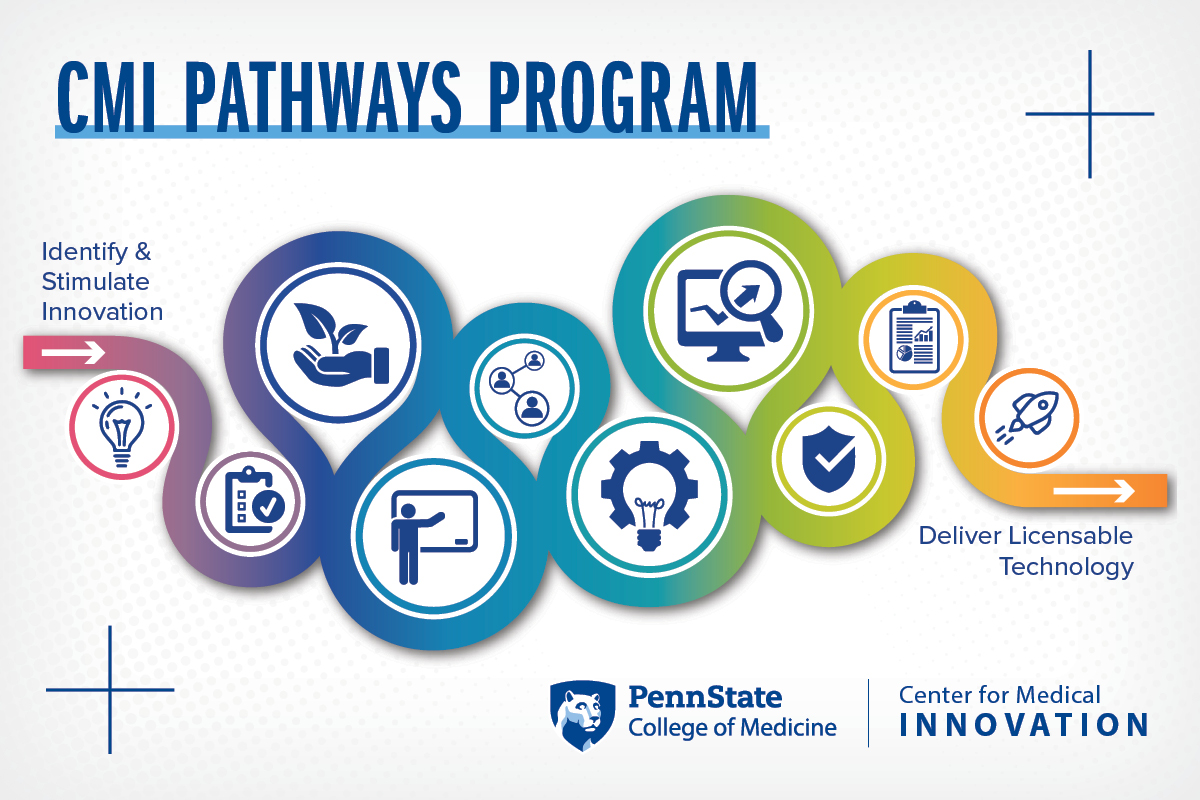Faculty bring innovations to life through Center for Medical Innovation Pathways Program

A new Penn State Center for Medical Innovation program is helping Penn State researchers translate their innovative ideas from the lab and clinic to the health care marketplace.
Faculty may juggle multiple responsibilities including lecturing, mentoring trainees, performing experiments, submitting grants, revising manuscripts and for some, time in the clinic with patients. When a discovery is made, adding the responsibilities of commercializing the new technology can be a daunting endeavor for a faculty member.
“Faculty and clinicians have significant, broad roles and responsibilities. We should not expect them to also become experts in technology development and commercialization,” said Kevin Harter, MBA, chief innovation officer at Penn State College of Medicine. “Our goal is to partner with faculty and supplement their clinical and scientific skills with our business development and entrepreneurial skills.”
CMI Pathways Program is different from other internal funding mechanisms. It provides faculty with an innovation project manager that works with faculty to identify critical milestones and endpoints that can help a technology or innovation reach the point where it can be commercialized.
“This program aims to strengthen the technology through a team-based developmental approach that addresses downstream requirements, including regulatory and reimbursement issues, and business case development to facilitate a handoff to the private sector and to form solid companies,” said Erika Swift, MBA, MHA, operations director of the Center for Medical Innovation. “Through seed funding and active project management, we help faculty reach our shared goal of transferring research innovations to the marketplace.”
Proof of Concept Seed Funding is the early phase of the Pathways Program and offers up to $75,000 for one year so investigators can obtain compelling data to secure external follow‑on funding for the technology. The later stage of the program, the Innovation Accelerator Seed Funding, provides faculty with up to $100,000 for one year so they can complete pivotal studies and acquire data to attract potential licensees.
The Innovation Accelerator Seed Funding is currently supporting two therapeutic projects. The first, by Gavin Robertson, PhD, professor of pharmacology, is a novel combination therapy for treating melanoma. Arun Sharma, PhD, professor of pharmacology, leads the second project investigating how a novel small molecule can be used to treat triple negative breast cancer.
Five projects recently received Proof of Concept Seed Funding and include:
- A novel implantable material to treat nerve pain by Sanjib Adhikary, MBBS, MD, professor of anesthesiology and perioperative medicine.
- A novel medical implant to treat long bone fractures by Jared Butler, PhD, assistant professor of engineering design.
- A novel medical implant and surgical system to treat hydrocephalus by Sprague Hazard, MD, associate professor of anesthesiology and perioperative medicine and of neurosurgery.
- A novel drug and device combination to treat osteoarthritis by Fadia Kamal, PharmD, PhD, assistant professor of orthopaedics and rehabilitation.
- A novel medical implant to treat ocular inflammation post‑cataract surgery by Seth Pantanelli, MD, associate professor of ophthalmology.

Seven Penn State researchers are participating in the CMI Pathways Program and include from left to right, top to bottom: Gavin Robertson, PhD; Arun Sharma, PhD; Sanjib Adhikary, MBBS, MD; Jared Butler, PhD; Sprague Hazard, MD; Fadia Kamal, PharmD, PhD; and Seth Pantanelli, MD.
Harter and Swift said the technologies moving through the program could someday make a difference to patients facing challenging diseases.
“We are proud of this program and our participating researchers,” Harter said. “We want faculty to know there are resources to support them through the challenging commercialization process.”
Learn more about the Pathways Program
Learn more about the Center for Medical Innovation
If you're having trouble accessing this content, or would like it in another format, please email the Penn State College of Medicine web department.
